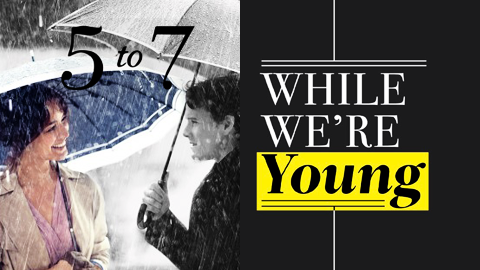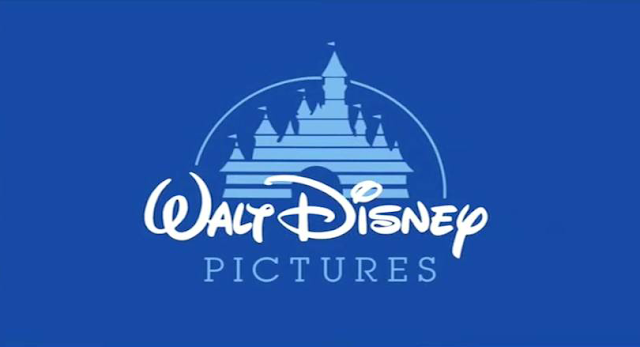5 to 7 & While We're Young
These are both films from this year that didn't get a lot of positive attention (or in 5 to 7's case, any attention?), but their premises intrigued me enough to check them out when I saw they were on Netflix. They're both far more charming and enjoyable than they have any right to be, but they each fall into traps-some different, some the same, all tired and cliche-that keeps them from being something truly special. Keep in mind I'll be discussing the endings of both films, so proceed with caution if you haven't seen them yet!
5 to 7 tells the story of a struggling young writer, Brian, whose life changes when he meets an older French woman named Arielle. He becomes infatuated, but things get complicated when he finds out she's married-and polyamorous. She and her husband have an arrangement that each can have a relationship on the side, but only from the hours of 5 to 7 on weekdays. This allows them to maintain a healthy, stable-if lacking in passion-home environment for their children. Brian agrees to be Arielle's lover on the side, but how long can the relationship continue before 5 to 7 stops being enough time?
Throughout the first act of this film, I kept thinking, wow. This is actually pretty good. The premise is unique enough that they could have just coasted on it and not bothered with anything else, like most romantic comedies with a "clever" story device, but Anton Yelchin is a likable leading man, Berenice Marlohe is riveting, and the dialogue is much more polished and intelligent than you typically see in these kinds of films.
The first issue is one I have with a lot of films (including While We're Young, actually), but I find it particularly worth pointing out here. And that is, why are we focusing on the male characters so much? Like really, why? Could anyone who watched this tell me Brian is a more interesting character than Arielle? I guess having her in a smaller role makes her more mysterious, or something, but there's huge chunks of the film where she completely disappears. Consensual polyamorous relationships are hugely misunderstood in our culture and I think more screentime for Arielle (and her relationship with Valery) could have resulted in a much more memorable, interesting film.
My second issue is with the horrendously long, drawn-out ending. Nowadays, most romantic films have to have happy endings. They can't conclude with a breakup or a death or an ambiguous ending. Now obviously I don't expect something with "comedy" on the label to be all doom and gloom, but I think this bombardment of happy endings completely underestimates the audience. Seeing a film such as this one taking the plunge and ending with its lead characters not ending up together, and then going to such great lengths to have a happy ending in spite of this, feels incredibly insulting. We couldn't end with Arielle looking fondly at Brian's published book, no, that's too understated-we have to show Brian with a wife and kid, but he's not as happy as he should be, and wants to know if he was Arielle's "perfect love", and by coincidence he meets up with her and she's wearing his ring, proving they were perfect together... I was groaning through the entire thing. The only way it could have been worse was if his new wife was Jane, Valery's ex-mistress.
That ending basically evaporated any good feelings I had about the movie. If you're going to take on such a sensitive and unexplored topic as polyamorous relationships, you need to do a hell of a lot better than that.
Josh and Cornelia are both involved in making documentaries, Josh as a director and Cornelia as a producer. However, Josh feels stunted in his career, and his relationship with Cornelia is strained as they watch all their friends become parents, knowing she's infertile. Everything changes when they meet young couple Jamie and Darby, two hipsters who also have a passion for documentary filmmaking. Cornelia is hesitant to befriend them, but Josh dives right in, exited at the prospect of being the "cool mentor". But as Josh and Jamie find themselves on the trail of an amazing true story, Josh has to ask himself, how far will he go to feel young again?
I wasn't a massive fan of Frances Ha, but I enjoyed it enough, and While We're Young had such a good cast and interesting storyline that I was exited to give Noah Baumbach another shot. While it was better than all of the negative reviews led me to think, it still did not live up to the expectations I had when I first heard about it.
The good is that the cast really is great, they work well together and the scenes with all four of them are really very fun. And there's a couple of good laughs to be had-my favorite scene had to be when Josh is pitching his 10-years-in-the-making documentary to a scatterbrained producer. Also, Dree Hemingway showed up for a few minutes! Big fan of her ever since I saw Starlet, so even that brief glimpse put a smile on my face.
The main problem is the same one 5 to 7 has: lack of screen-time for the female characters. Cornelia is trying to decide if she can be happy with a child-free existence, but otherwise she's really quite content with her life. Similarly, Darby isn't that motivated or ambitious, satisfied with her laid-back hipster lifestyle. But their complacency seems to make them uninteresting to the camera, because both disappear from large chunks of the story; specifically Darby, who had maybe 2 scenes in the entire latter half of the movie. The story of the middle-aged man unable to deal with his increasing age and feelings of inadequacy, or the ambitious young man who will do anything to succeed, are both stories that have been told a million times. It's fine for them to be present, but is it really so difficult to offer equal screen-time to some lesser-told stories-those of the wives of these two character types? Especially since this is advertised as a story of two couples, giving such complete focus to Josh and Jamie felt wrong.
The other major issue is the ending, in which Cornelia and Josh adopt a baby boy. Technically, this is a logical progression-despite trying to convince themselves otherwise, both characters seem to desire a baby throughout the movie. However, their adventures with Jamie and Darby took a toll on their relationship, and they're not in a great place when we leave them pre-adoption. While the ending takes place a year later, getting approved for adoption is extremely complicated and there could not have been much time between the father's ceremony and the decision to adopt a baby. Therefor, they made this decision while their relationship was recovering from a pretty disastrous series of events. While the screenwriters may not have intended this interpretation, the fact is that we live in a world where many people choose to have children to try and "fix" their broken relationships, and that's exactly how Cornelia and Josh's decision reads. It's yet another entry into the "having children for selfish, self-serving reasons is ok" book. And I'm really uncomfortable with that.
So, we have two decent films that just needed a few changes to be legitimate good films. Isn't it disappointing when that happens? I would still recommend While We're Young, but 5 to 7 is definitely not worth the trouble unless you're really, really interested in either the subject matter or lead actors.
I hope you're all watching lots of great movies, and if you have something to say-agree with me, disagree with me, whatever-let me know in the comments!
I wasn't a massive fan of Frances Ha, but I enjoyed it enough, and While We're Young had such a good cast and interesting storyline that I was exited to give Noah Baumbach another shot. While it was better than all of the negative reviews led me to think, it still did not live up to the expectations I had when I first heard about it.
The good is that the cast really is great, they work well together and the scenes with all four of them are really very fun. And there's a couple of good laughs to be had-my favorite scene had to be when Josh is pitching his 10-years-in-the-making documentary to a scatterbrained producer. Also, Dree Hemingway showed up for a few minutes! Big fan of her ever since I saw Starlet, so even that brief glimpse put a smile on my face.
The main problem is the same one 5 to 7 has: lack of screen-time for the female characters. Cornelia is trying to decide if she can be happy with a child-free existence, but otherwise she's really quite content with her life. Similarly, Darby isn't that motivated or ambitious, satisfied with her laid-back hipster lifestyle. But their complacency seems to make them uninteresting to the camera, because both disappear from large chunks of the story; specifically Darby, who had maybe 2 scenes in the entire latter half of the movie. The story of the middle-aged man unable to deal with his increasing age and feelings of inadequacy, or the ambitious young man who will do anything to succeed, are both stories that have been told a million times. It's fine for them to be present, but is it really so difficult to offer equal screen-time to some lesser-told stories-those of the wives of these two character types? Especially since this is advertised as a story of two couples, giving such complete focus to Josh and Jamie felt wrong.
The other major issue is the ending, in which Cornelia and Josh adopt a baby boy. Technically, this is a logical progression-despite trying to convince themselves otherwise, both characters seem to desire a baby throughout the movie. However, their adventures with Jamie and Darby took a toll on their relationship, and they're not in a great place when we leave them pre-adoption. While the ending takes place a year later, getting approved for adoption is extremely complicated and there could not have been much time between the father's ceremony and the decision to adopt a baby. Therefor, they made this decision while their relationship was recovering from a pretty disastrous series of events. While the screenwriters may not have intended this interpretation, the fact is that we live in a world where many people choose to have children to try and "fix" their broken relationships, and that's exactly how Cornelia and Josh's decision reads. It's yet another entry into the "having children for selfish, self-serving reasons is ok" book. And I'm really uncomfortable with that.
So, we have two decent films that just needed a few changes to be legitimate good films. Isn't it disappointing when that happens? I would still recommend While We're Young, but 5 to 7 is definitely not worth the trouble unless you're really, really interested in either the subject matter or lead actors.
I hope you're all watching lots of great movies, and if you have something to say-agree with me, disagree with me, whatever-let me know in the comments!






Comments
Post a Comment